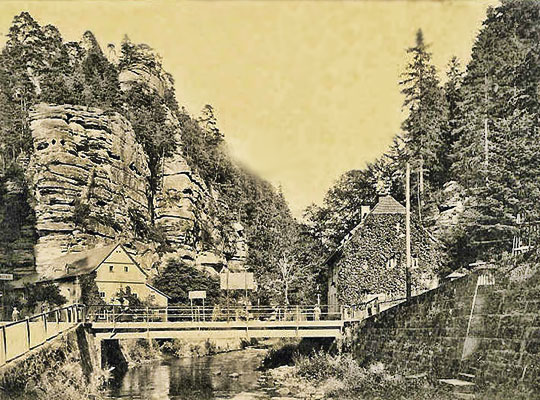History of the Gorges
Local sandstones were formed during the Mesozoic era about a hundred million years ago, when sandy sediments at the bottom of the sea formed layers several hundred meters thick. Later, the sea retreated and volcanic activity during the Tertiary caused breaking the sandstone layers into many pieces. Wind and water erosion then completed the work and made it possible to form unique formations you will not see anywhere else.
For a long time, the area around the Kamenice River was hardly accessible and it was shrouded in mystery.
The spot, where the trail ended and only rocks and water continued, was even called The End of the World.
Attempts to explore the area further were considered insane or even unrighteous by local people.
For a long time, gorges of the Kamenice River represented a big obstacle that residents of the right bank villages Mezná and Vysoká Lípa had to overcome every Sunday on their way to church in Růžová. However, the river also served as a source of livelihood. Fishermen would fish here for trout and salmon, lumberjacks used the river to float timber.
Only at the end of the 19th century was the Kamenice River better explored and short after that, first tourists came. However, an interesting event took place earlier – in the year 1877 in the Hřensko pub U Zeleného stromu, a risky bet was placed. Five adventurers decided to conquer the Kamenice River and its gorges on a raft. They actually completed this challenge and with the help of three rafts managed to get from Dolanský mlýn to Hřensko, and thus created a new tradition taking the use of the gorges as a tourist attraction.
So that people could actually get here and enjoy the beauty in a more comfortable way than sailing on a raft, duke Edmund Clary-Aldringen had been investing a lot since the 80’s of the 19th century in making the area more accessible. As the owner of the masterdom he cared a lot about making the tourists’ experiences better, so he made both gorges accessible. He invited experts from Italy and under their supervision two hundred laborers – barbars built walkways, bridges, tunnels, footbridges and weirs. Barbars, whos name is derived from the name of the biblical villain Barabbas, were originally railway workers who performed the hardest labor such as building tunnels, e.g. in the Alps. It was an interesting community, famous for its nomadic way of life, dangerous work and unique tradition. They dug the tunnels for pedestrians in the area of Kamenice River canyon by first warming the sandstone rock using fire and than immediately cooling it with water so that the rock would develop cracks, making it easy for them to quarry it. The Czech Switzerland Mountain Club also participated in making the gorges accessible.
As a first section, the 500 meters long Edmund (or Silent) Gorge was opened in the year 1890, followed by opening of a restaurant. At that time, five boats used to ride in the gorge. Ferrymen, who steered them with punt poles, were dressed in matching sailor uniforms. Eight years later, the preparation of 250 meters long Wild Gorge was finished. The popularity of the place kept growing, which illustrate written documents from the 20’s of the 20th century. At that time, 21 boats were in operation and about 160 000 people visited the place every year. Strict regulation were applied, it was forbidden to take photographs for commercial use, peddle, stick political posters, and beggars would not even be alowed to enter. In the year 1964, Czechoslovak army helped with the reconstruction of both gorges.

